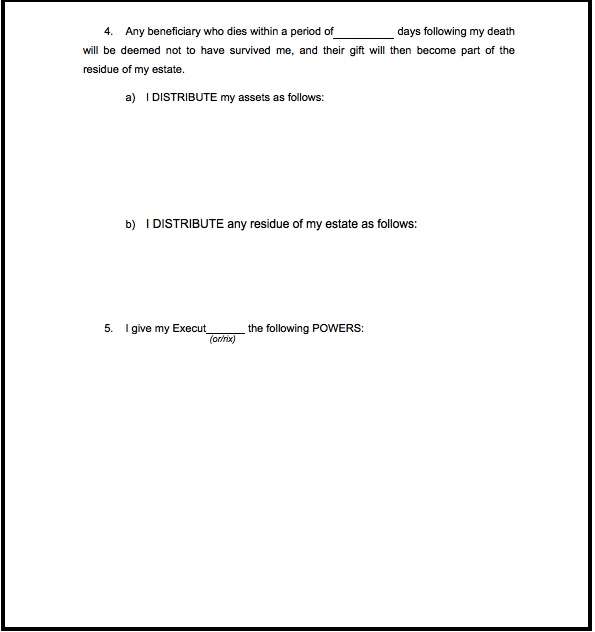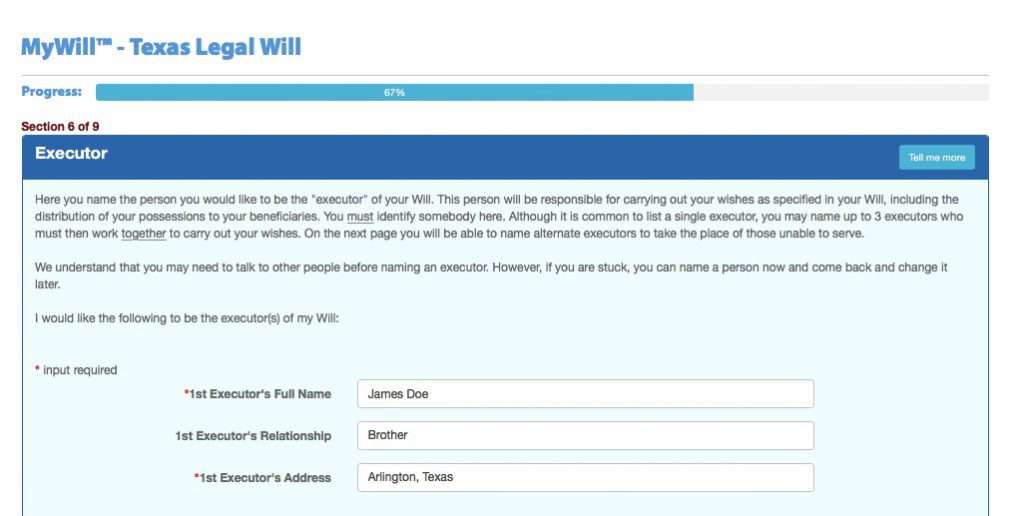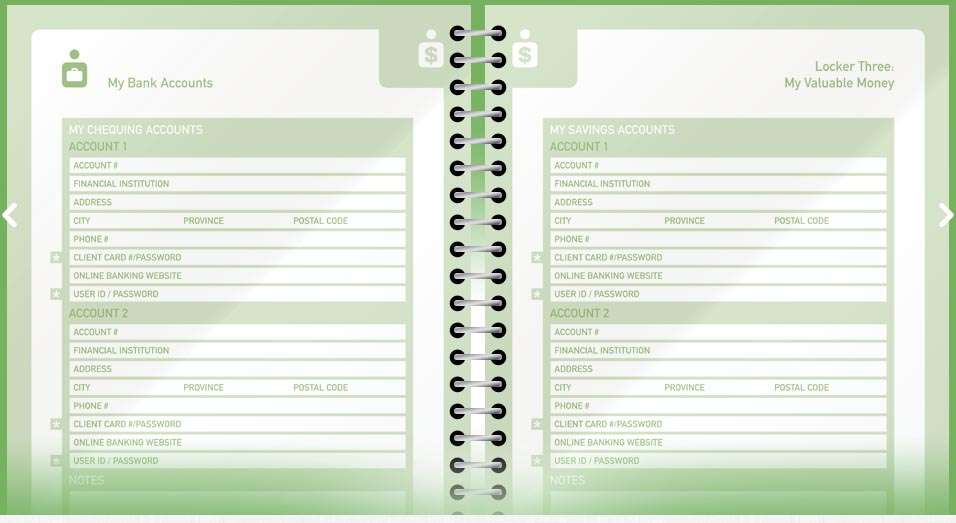Table of Contents
What is a Last Will and Testament?
A Last Will and Testament is a document that is written while you are mentally capable, that expresses your wishes for after you have died. It deals with the distribution of your possessions (your “estate”) and makes key appointments like your Executor (the person who will carry out the instructions) and Guardians for children (if applicable).

A Last Will and Testament, or simply, a “Will”, has to be written. It can be handwritten or typed, and must be signed and dated at the end. If it is typed, the signing must be witnessed by two competent adults who have nothing to gain from the contents of the Will.
Some jurisdictions accept an entirely handwritten document as a Will even if it is not witnessed. This is a “holographic” Will. The law allows this in order to allow people in desperate situations to still prepare their Will even if they cannot find witnesses. It is generally not recommended as a Will writing approach for people under normal circumstances.
Once it is printed, signed and witnessed, your document serves as a legal Last Will and Testament.
What information goes into a Will?
In its simplest form, a Last Will and Testament starts with a declaration that the document is a Will. And identifies the “testator” (the person making the Will).
The Will typically revokes (cancels) all previous Wills.
The next clause in the Last Will and Testament typically appoints an Executor. The Executor usually has to file the Will with a probate court where it is accepted as the official Will. The Executor is then given a court document called a “Grant of Probate” that authorizes them to act as the estate administrator.
Your Last Will and Testament would then usually describe the distribution of your estate. This can simply be a direction to pass the entire estate to a single individual, or shared between people. Or it can include specific bequests to certain “beneficiaries” with the remainder going to other beneficiaries. For example, something like:
I leave $10,000 to the Humane Society, I leave my Steinway grand piano to my niece Jane Doe. The remainder is to be divided in equal shares between my two children Jack and Jill Brown.
A well drafted Last Will and Testament would then include a series of “what-if” contingencies. For example, what would happen to Jack Brown’s share of the estate if he were to pre-decease you?
Every possible scenario should be covered in a Will. It should take into account beneficiaries, executors or guardians pre-deceasing you. It should take into account births, marriages and deaths in your family and in the families of anybody named in the Will.
A well written Last Will and Testament is usually at least four or five pages long. Many of the clauses in a Will explain the limits of powers granted to the Executor. The clauses may also set up trusts for young beneficiaries and explain the terms of these trusts. It is easy to see how a simple declaration of your wishes can turn into a complex legal document.
What does an Executor do?
Once the Executor has been given the authority to act, they have the responsibility to gather and secure all “assets”. Assets are any bank accounts, investments, property, possessions, and even “digital assets” (online accounts).
Securing of assets could include changing locks and taking an inventory of personal possessions.
The Executor will then typically open a bank account for the estate, and deposit all of the financial assets into this bank account. They will then distribute the assets to the “beneficiaries” according to the instructions in the Will.
Is a Will the same as a Living Will?

A Living Will is an unfortunately named document that serves a very different purpose to a Last Will and Testament. A Living Will is typically made up of two parts; an Advance Directive and a Healthcare Proxy (all of these names vary slightly depending on your State).
A Living Will is a document that is in place while you are alive, but you have lost capacity to express your wishes for medical treatment. You would prepare a Living Will at a time when you are well, for it to come into effect if you were ever to lose capacity.
The Last Will and Testament does nothing while you are alive and comes into effect when you die. A Living Will is in effect while you are alive (but incapacitated), and ceases to function the moment you die.
A Living Will allows you to make a “substitute decision maker” or “healthcare representative”. If you were in a coma, and the attending physicians needed to make a decision regarding your care, they would turn to your appointed decision maker to be guided on their course of action. This could include knowing whether to maintain life support treatments.
The Living Will also includes “Advance Directives”. This is an expression of medical treatment that you wish to receive if you were ever in an irreversible terminal condition i.e. a coma with little to no chance of recovery. The Advance Directive usually includes directions for tube feeding, Do Not Resuscitate (DNR) orders, pain medication and other life-sustaining treatments.
Do I need a Last Will and Testament?
Yes. There is no situation where dying without a Last Will and Testament is a preferred course of action.
If you die without a Will your family will have to resolve your estate with no direction. An Executor would have to be appointed by the courts, and the distribution of your estate will be determined by your State rules of “intestate succession”. These rules are different for each State and rarely represent a person’s real wishes.
If you have any family or loved ones that you care about, dying without a Will imposes stress and confusion on these people. It can takes months of acrimony to sort out an estate with no Will. Family tensions come to the surface with different people trying to assert their rights to the estate.
Much of the estate can be lost to legal fees, as we have seen with celebrity deaths like Prince.
Dying without a Will also robs you of an opportunity to do something useful with your estate. Within your Will you can set up charitable donations, and leave meaningful legacies. You could for example leave a bequest to a social housing initiative, or contribute to your church, or leave your piano to your nephew who is just learning to play. You could leave $5,000 to your niece to fund her education or to travel around the World.
Bequests in your Will are powerful opportunities to make a difference to the World. Don’t be like Aretha Franklin who chose to hand much of her $80M estate to litigation lawyers rather that fund a trust for aspiring musicians in her hometown Detroit.

When should I write a Will?
Traditionally, writing a Will has been an expensive and inconvenient process. As a consequence, many people have thought of it as a once-in-a-lifetime task. And because your Will needs to reflect your circumstances at the time of your death, there is a misconception that a Will should be written in contemplation of death, ideally, just before death.
This is an impractical approach to Will writing.
You should write your Will as soon as you are an adult, and update it throughout your life as your circumstances change. You should always have a Will in place.
Your Will should be updated whenever there is a change in your family circumstances like your marital status, or the arrival of children. Also, when your children become adults and have children of their own.
But you should also update your Will if there is a change in circumstance for anybody named in the Will. For example, if your Executor is taken ill, or your named guardians move overseas. Or a beneficiary has a windfall. All of these situations should at least prompt a review of the Will, even if you decide not to change anything.
Fortunately, many modern Will writing tools make it much easier to maintain your Will to reflect your current circumstances.
How can I write a Will?
There are essentially three different approaches to writing a Will.
1. Handwrite a Will, or use a blank form kit.
If you refer back to the earlier part of this article that describes the essential elements of a Will, you can see how easy it could be to write your own. You could literally write on the back of a napkin that you are preparing a Will, that your estate is all going to your spouse, and then sign the document. In most US states, you will have prepared your Last Will and Testament. In Canada there was a famous case of a farmer, pinned by his tractor, who scratched his Will into the fender with a pocket knife. This was accepted as a legal Last Will and Testament.
Once you understand how simple a Will can be to be recognized as legal, you can then understand the proliferation of blank form or do-it-yourself “Will kits”. These provide a rough outline of a Will with an opening clause and a section for signing. You then fill in the blanks with your name, the name of your Executor and your intentions for distributing your estate.

These Will kits can sometimes even be free.
The problem is that they are generally a terrible approach to writing a Will, and often result in a document that cannot be enforced. Almost all news articles that discuss the pitfalls of preparing your own Will are referring to blank form Will kits like this.
In the example above, this is a very difficult blank form to complete. It is almost impossible for somebody not trained in law to complete a blank section asking for “Powers granted to the Executor”.
2. Write your Will with a lawyer.
This is at the opposite end of the spectrum to preparing your Will using a blank form kit. This approach gives you the opportunity to receive legal advice if you have doubts about your situation. You may also receive some tax planning advice and general information about “estate planning”.
If you have a complicated situation, for example, a child with special needs receiving government benefits, where you need to set up a special trust to protect those benefits, then there is value in working with an estate planning expert who can guide you through the legal implications of your situation.
Certainly, if you are unsure about the legal implications of your distribution plan. For example, disinheriting your spouse. Then you would benefit from a consultation with an estate planning attorney.
However, working with an estate planning attorney is expensive and inconvenient. Lawyers typically charge upwards of $800 to prepare a simple Will, even more if you also need a financial Power of Attorney and Living Will.
Estate planning lawyers rarely make house calls, so if you are a professional couple with young children you will need to both arrange time off work and childcare, to meet with the lawyer in their office. Then a week later arrange the same for the document signing process.
If you ever need to update your documents for whatever reason, you will have to incur the same time and expense again. Many people are drawn to the service at USLegalWills.com when they need to make a simple update to their Will, and are quoted $500 to change something like an Executor appointment.
3. Use an online Will writing service.
For the last decade or so, a new type of service has emerged to fill the gap between inadequate blank kits, and overpriced lawyers. Giving you a professional grade Last Will and Testament, at a do-it-yourself price.
Online Will writing services guide you through the process of preparing your Will, rather like tax preparation software. You are asked a series of questions, at the end of which, your document is compiled.

These services are affordable (USLegalWills.com charges $39.95 for a Will), and convenient. You can put your children to bed, sit on the sofa with your partner and an iPad, and write your Will. If you need to discuss appointments with family members, you can save your work and continue the next day.
The whole process can take 20 minutes, or if you prefer, you can take weeks to get everything just the way you want it.
Services like USLegalWills.com typically have trained professionals ready to answer any questions by phone, email or live chat.
With a growing number of service providers offering Will writing options, the competitive marketplace has inspired online service to innovate and launch complementary services beyond the simple document preparation.
For example, USLegalWills.com has a MyLifeLocker service to help maintain an inventory of assets, a MyVault service to upload important files, all accessed through a MyKeyholder service. This means that the right information gets to the right people at the right time and not before.
Traditional Will writing services through an estate planning attorney have not fundamentally changed in a hundred years.

Do I need a Lawyer to write a Will?
You need a lawyer if you need legal advice. If you have a particular situation where you need somebody qualified in the law, to give you a legal opinion, a lawyer can give you this opinion.
Most people do not need legal advice when preparing a Will.
For example, if you have a distribution plan for your estate, where everything will go to your spouse. If you are both involved in a common accident, then everything will be divided between your children. You may need a trust set up for your children, and to name a guardian if they are still minors.
There is nothing in this scenario that requires an interpretation of the law, or a legal opinion.
This type of situation can be comfortably handled by an online Will writing service like the one at USLegalWills.com.
Not everybody has the financial means to hire an attorney, and some people are not geographically close to an attorney. But everybody can and should prepare their Will. This is why there is absolutely nothing in the statutes that requires the use of a lawyer to prepare a Will.
Some people who can afford to pay an expensive attorney, feel that it is simply not good value for money.
What is the best way to write a Last Will and Testament without a Lawyer?
If you are writing your Will without a lawyer you have to weigh up cost, convenience, and quality of service.
A blank form Will kit may be cheap, or even free, but they are rarely State specific, and not usually kept up-to-date to reflect changes in the law. If they are free they may or may not have been prepared by a lawyer, and they almost certainly won’t offer you support or answer any questions that you may have.
Online Will writing services offer the convenience of writing a Will yourself, but the service and documents are usually signed off by lawyers. They are State-specific and offer a support team to answer any of your questions.
Write your Last Will and Testament today
If you are considering making a Will, it’s worth trying one of the leading online Will writing services. It will at least give you a feel for the information that goes into a Will. You may find the process is not as intimidating as you first thought.
- Testamentary Trusts – what are they and how are they created? - May 9, 2024
- Every document you need for a complete estate plan. - October 29, 2020
- Estate Planning in troubled times - April 3, 2020













